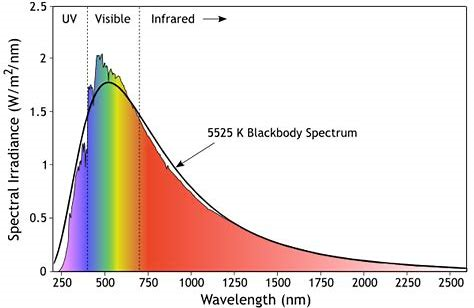Suppose we look (above the Earth's atmosphere) at the wavelength ($=\frac c f)$ spectrum emitted by the Sun:
This shows that the Sun is approximately a black body with a temperature of about $5525(K).$ Now If we place a black body at a distance $l$ from the Sun will the radiation coming from the Sun (after a while, depending on $l$) causes this black body to have a temperature of $5525(K) $ too (by means of the blackbody radiation corresponding to the Sun), or will this only happen when the black body is completely surrounded completely by a material at $5525(K) $ (implying that the black body we place somewhere around the Sun is in a state of dynamical equilibrium)? Somewhat like a thermometer put in interstellar space will show a temperature of $2.7(K)$ because it's surrounded at all sides by the CMBR.

